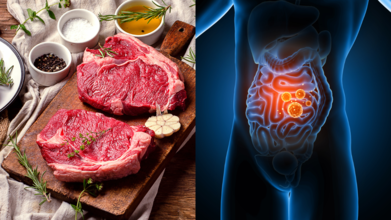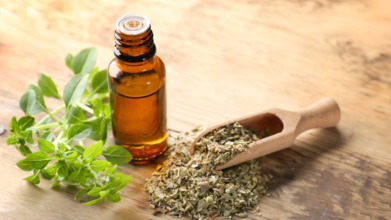- Health Conditions A-Z
- Health & Wellness
- Nutrition
- Fitness
- Health News
- Ayurveda
- Videos
- Medicine A-Z
- Parenting
- Web Stories
8 'Healthy' Sugars and Sweeteners That May Be Harmful To Your Health

Sugar (Credit: Canva)
Market is filled with sugar and sweeteners that are marketed as healthy alternatives to regular sugar. With an increasing number of people opting for healthier food options, sugar substitutes are often seen as a "cheat code" for indulging in desserts while staying health-conscious as they are low in calories. However, not everything that is sold is healthy.
8 Sugar Substitutes That Are Not Healthy
1. Raw cane sugar, derived from sugarcane is one of the most sold substitute of sugar that is commonly used in desserts, beverages, and more, prized for its versatility and sweet, slightly fruity taste. Despite being marketed as a healthier alternative to regular sugar, raw cane sugar is chemically identical to its refined counterpart. Both are composed of sucrose, which is made up of glucose and fructose. Excessive consumption of raw cane sugar can contribute to weight gain and increase the risk of chronic conditions such as heart disease and diabetes.2. Saccharin is a widely used artificial sweetener found in diet sodas, low-calorie candies, and other sugar-free products. It is a non-nutritive sweetener, meaning it doesn’t contribute calories or carbohydrates to your diet. However, animal studies have shown that it can alter the gut microbiome by reducing beneficial bacteria, which are essential for immune function and digestion. Disruptions to gut health are linked to conditions like obesity, inflammatory bowel disease (IBD), and even colorectal cancer.
3. Aspartame is a common artificial sweetener found in many diet foods, including sugar-free sodas, ice creams, and candies. With no calories or carbs, it is a popular choice for those trying to lose weight. However, some studies suggest that aspartame might not be as beneficial for weight management as previously thought. One review of 12 studies found that aspartame did not significantly reduce calorie intake or body weight compared to regular sugar.
Additionally, aspartame has been linked to lower levels of HDL (good) cholesterol, a risk factor for heart disease. Some users report headaches, dizziness, and mood changes, though more research is required to confirm these potential side effects.
4. Sucralose, best known by the brand name Splenda, is a widely used artificial sweetener found in many sugar-free beverages and foods. While earlier studies suggested it doesn't affect blood sugar levels as significantly as regular sugar, recent research shows that sucralose can increase blood sugar and insulin levels, particularly in individuals who don’t regularly consume non-nutritive sweeteners.
Moreover, sucralose may have additional adverse effects. Animal studies have suggested that it may reduce beneficial gut bacteria, promote inflammation, and contribute to weight gain. Heating sucralose, such as in baking, can also produce potentially harmful chemical compounds.
5. Acesulfame K is a heat-stable artificial sweetener often combined with other sweeteners in low-calorie products like baked goods and frozen desserts. Though it’s considered safe by US health authorities, there’s ongoing debate about its long-term health effects. Some studies have raised concerns about its potential cancer-causing properties, pointing to flaws in the original safety testing.
Research on Ace-K's safety has been mixed. Animal studies have shown that prolonged use may impair mental function and memory, and alter gut bacteria. Other studies have suggested it could contribute to weight gain. However, more high-quality human studies are needed to reach a definitive conclusion.
6. Xylitol is a sugar alcohol commonly used in sugar-free gum, mints, and toothpaste. It has a much lower glycemic index than regular sugar, meaning it has less impact on blood sugar and insulin levels. Research suggests that xylitol can help prevent dental cavities in children, and studies in animals have linked it to increased bone volume and collagen production.
However, xylitol can cause digestive issues, particularly for people with irritable bowel syndrome (IBS), leading to symptoms like bloating, diarrhea, and stomach pain. It is also highly toxic to dogs, causing low blood sugar, liver failure, and even death if ingested.
7. Agave Nectar derived from the agave plant, is often marketed as a healthier alternative to sugar due to its low glycemic index. It’s composed primarily of fructose, which has a minimal effect on blood sugar levels. This has made agave syrup popular in products aimed at people with diabetes.
However, research suggests that excessive fructose consumption can lead to fatty liver disease, insulin resistance, and increased levels of LDL (bad) cholesterol and triglycerides, all of which are risk factors for heart disease.
8. Sorbitol is a sugar alcohol naturally found in fruits and plants, used in many sugar-free products. While it contains fewer calories than regular sugar, it has only about 60% of its sweetening power. Sorbitol is often used in sugar-free drinks and desserts due to its smooth texture and mild taste. However, sorbitol acts as a laxative, stimulating bowel movement. Consuming large amounts can lead to digestive issues like bloating, cramps, and diarrhea, particularly for people with IBS.
Beef, Pork, and Lamb Might Do More Than Fill You Up; Study Finds They Could Be Flaring Up Your Gut

Credits: Canva
Gaining weight by eating too many lamb chops or beef burgers is not the only risk. A new study published in Molecular Nutrition & Food Research suggests that red meat might be less of a comforting indulgence and more of a gut irritant. According to researchers at Capital Medical University in China, diets overloaded with pork, beef, or mutton could stoke inflammation inside the digestive system, potentially worsening gut-related disorders.
The Experiment
Scientists turned to an animal model. Mice were fed a diet high in red meat before being given a chemical that induces colitis, a condition that resembles inflammatory bowel disease (IBD) in humans. Results showed that the red-meat-fed mice experienced significant weight loss, shorter colons, and visible tissue damage. Their immune systems also went into overdrive, flooding the gut with inflammatory cells. Essentially, the study found that when the gut is already irritated, red meat makes the fire burn hotter.
All Red Meat Counts
Before you point fingers at beef or lamb individually, the researchers clarify that the issue is not with one specific type of red meat. The effect was observed across the board, whether it was pork, beef, or mutton. The common thread was the way red meat in general seemed to intensify inflammatory signals in the gut.
Gut Bugs in Trouble
One of the most striking findings was how red meat tampered with the gut microbiome—the trillions of tiny organisms that work quietly to regulate digestion and immunity. In the study, mice on red meat lost beneficial bacteria, particularly those that protect the gut lining and keep inflammation low. In their place, harmful microbes took over, making the digestive tract more vulnerable.
Why This Matters for Humans
While the experiment was done in mice, the implications for humans are worth paying attention to. People with conditions like Crohn’s disease or ulcerative colitis often report flare-ups after eating red meat. The study offers a possible explanation for this: the combination of heightened inflammation and a disrupted microbiome makes the gut more sensitive. For those already battling IBD, red meat might be less of a protein-packed friend and more of a troublemaker.
The Moderation Mantra
Does this mean you should swear off meat forever? Not necessarily. The researchers were clear that the study does not prove red meat directly causes IBD or that it should be completely eliminated from your plate. Instead, moderation seems to be the golden rule. If you do enjoy red meat, balance it out with plenty of fibre, fruits, vegetables, and lean proteins such as fish or chicken. A varied diet gives your gut a better chance of staying healthy and less inflamed.
Handle with Care
Red meat has long been under scrutiny for its links to heart disease and cancer risk, and now gut health joins the list of concerns. While more human studies are needed, the findings serve as a gentle nudge to reconsider how often you pile your plate with steak or kebabs. Your gut microbiome is like a delicate ecosystem. Treat it kindly, and it will return the favour.
Can Bananas Help You Build Muscle, Improve Digestion, and Gain Weight the Healthy Way?

Credits: Canva
When it comes to healthy eating, bananas often get underestimated. We usually treat it as a quick snack, but rarely do we stop to appreciate just how powerful this fruit can be. Bananas are not just about curbing midday hunger pangs; they can help you gain weight the right way, support muscle recovery, and even improve digestion.
The Banana as a Natural Energy Bar
“Banana is one of the high-protein fruits. It is also called a natural energy bar because of its rich nutrient profile,” says Nutritionist Anushi Jain. She explains that bananas act as both a quick energy source and a way to sustain fullness for longer periods.
That is because bananas are packed with carbohydrates, dietary fibre, and natural sugars like glucose, fructose, and sucrose. Together, these make bananas an effective food for anyone looking to put on weight in a healthy manner. But it is not just calories that make them special. Bananas also deliver a solid dose of potassium, vitamin B6, magnesium, and antioxidants, all of which contribute to overall health while promoting muscle recovery.
Calories That Count
One of the simplest reasons bananas work well for weight gain is their calorie content. A single medium banana provides around 100–120 calories, making them a convenient way to bump up your daily intake. But the real magic happens when you pair bananas with protein and healthy fats.
“When combined with foods like nut butters, milk, or seeds, bananas become a balanced meal that supports both muscle building and gradual, healthy weight gain,” adds Jain. In other words, instead of relying on protein powders or supplements, you can simply slip bananas into your everyday meals for better results.
Bananas and Better Digestion
Bananas do not just help you add calories; they also help you use them well. “Bananas are high in calories and important nutrients like potassium, vitamin B6, and fibre. They also help with digestion, making it easier for the body to absorb nutrients,” explains Dr Shabana Parveen, Head of Dietetics at Artemis Hospitals.
This means that adding bananas to your diet is not just about eating more but also about ensuring your body makes the most of the food you consume. Proper digestion is the backbone of healthy weight gain, and bananas play a quiet but crucial role here.
Easy Ways to Add Bananas Into Meals
Another reason bananas are a favourite among nutritionists is their versatility. They do not demand elaborate recipes or complicated meal prep. “Bananas slip into meals effortlessly,” says Jain.
Here are some easy ways to make the most of them:
- Smoothies: Blend bananas with milk, nut butter, oats, or seeds to create a calorie-dense shake that doubles as breakfast or a post-workout booster.
- Breakfast Bowls: Layer sliced bananas over oatmeal, porridge, or yoghurt for extra creaminess and a burst of energy.
- Nut-butter Pairing: Spread peanut or almond butter on banana slices for the perfect protein-fat-carb combo.
- Desserts: Use mashed bananas in muffins, pancakes, or healthy energy bars as a natural sweetener.
- Post-workout Snack: Pair bananas with whey protein or nuts to replenish glycogen and aid muscle repair.
- Frozen Treats: Blend frozen bananas into a creamy, guilt-free ice cream substitute.
“Bananas are a healthy choice for people who want to gain weight without eating processed foods,” Dr Parveen points out. Whether you mix them into shakes, mash them into bakes, or simply pair them with a handful of nuts, bananas deliver nutrition in the simplest, tastiest form.
Big Benefits
Can bananas help you build muscle, improve digestion, and gain weight the healthy way? The answer is a resounding yes. They are calorie-rich yet wholesome, versatile yet fuss-free, and packed with nutrients that go beyond just filling you up.
Both Jain and Dr Parveen agree that when combined with other nutrient-dense foods and regular exercise, bananas can become a powerful ally in your health journey. Whether your goal is to bulk up, repair muscles, or just keep your gut happy, the next time you reach for a snack, you might want to think banana.
Is Oil Of Oregano Really A 'Magic Cure'?

Credits: Canva
Oil of oregano, also known as oregano oil, is a concentrated extract derived from the leaves of the oregano plant. Typically available in liquid drops or capsule form, it has long been promoted for its potential health benefits, particularly during cold and flu season. Some people dilute it in water or juice, while others add it to their supplement routine.
For centuries, oregano oil has been praised in traditional remedies for its antimicrobial and immune-supporting properties. Modern studies suggest that compounds like carvacrol and thymol found in the oil may help fight certain bacteria, fungi and viruses, at least in laboratory and animal studies.
But experts caution against overestimating its power. As USA Today quotes Mascha Davis, MPH, RDN, a registered dietitian and nutritionist, “While oil of oregano can be part of a short-term wellness strategy, it’s not a magic cure-all.” Much of the evidence so far has not been tested in humans, making it difficult to draw strong conclusions about its effectiveness.
Why Was It Believed To Be A 'Magic Cure'?
Oregano has long been associated with Romans and Greeks and is said to trace back as early as 3000 BC, when it was used by Assyrians. It has been used in folk medicine for over many centuries and is extracted from the leaves of oregano. In the Middle Ages, the plant was considered a magic herb that could ward off witches and even the devil himself. This is why the oil extracted from it earned its name as the 'Magic Cure'.
Also Read: ‘Drink Castor Oil To Cleanse Your Colon,’ Says Sadhguru, But Science Isn’t Convinced
What It Can and Can’t Do
Research shows oregano oil does have antimicrobial and antioxidant properties, but clinical trials on humans remain limited. Benefits linked to digestion or immunity have largely been observed outside the human body, in cell or animal studies.
Who Should Avoid It
Despite its popularity, oil of oregano isn’t safe for everyone. Davis also advises that those who are iron deficient, pregnant, breastfeeding, allergic to mint, or taking certain medications, such as blood thinners or drugs for diabetes, should avoid it unless directed otherwise by a healthcare provider.
Even healthy individuals should use it with caution. Because it’s highly concentrated, taking too much or using it without dilution may irritate the gut lining. Experts recommend using it sparingly and only for short durations, such as a few days to a week, while closely following dosage instructions.
Read: The Truth About Cooking Oils: Which One Should You Really Use?
The Bigger Picture
Relying on oregano oil alone for long-term health isn’t sustainable. Experts emphasize that proven habits, like eating a nutrient-dense, plant-based diet, getting quality sleep, managing stress, and incorporating probiotics, are more effective for maintaining immunity and gut health in the long run.
The takeaway? Oil of oregano may have its place as a short-term supplement, but it’s not the all-in-one remedy it’s often marketed to be.
Read More: Common Cooking Oil Ingredient May Cause Your Breast Cancer
© 2024 Bennett, Coleman & Company Limited

